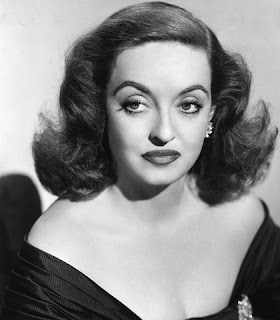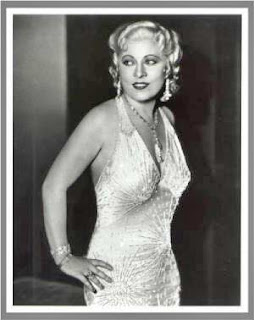Casting the pivotal role of Norma Desmond in the noir masterpiece Sunset Boulevard was no easy task. What Billy Wilder and the rest of pre-production knew was that they needed a woman who could play, not only a former actress, but a symbol of all that Hollywood represented-- at its best and at its worst. Norma had to be over the top-- the classic diva who had fallen under the spell of her own delusions-- but she also had to carry within her a torrent of pain. The performer would likewise have to be brave enough to go before the camera, warts and all, and show the world the remaining carcass of a once proud beauty. Though far from decrepit, for the latter reason, Mae West (left) turned the role down. She had a rep to protect after all!
Mae may have seemed like a shoe-in, living in her own "Miss Havisham"-like palace at the Ravenswood Apartments where, in her land of pink and white satin, time indeed seemed to stand still. Mae had no qualms about showing her self-love and pride in her work, which could have transferred over well into a character who still sat around watching her old movies. But therein, the comparisons stopped. Mae's sole purpose in life was to bring joy and laughter to her audiences. Thus, playing a broken down, has-been turned murderess was definitely out! Mae also would not have liked the idea of playing such a raw and emotionally dependent heroine; her ladies were tough as nails and knew there were plenty of Joe Gillises in the sea. So, the part more appropriately went to the incomparable Gloria Swanson (right), who threw herself so ferociously into the role of the silent film spider-woman that people would forever confuse her with the character. No shrinking violet, Gloria wasn't afraid to be dark and dangerous, and her unapologetic portrayal of the disturbed and love ridden femme fatale provided a remarkable bookend to a sterling career and, some say, the first era of film.
Mae's stamp still remained on the finished product, however, even if only in a small way. It turns out that she inspired the presence of Norma's pet chimp and thus the brilliant references in the film to Joe Gillis as Norma's monkey. Mae herself had a monkey, (as well as a house boy, if you refer to her companion Paul Novak as such), and Wilder found the inspiration too good to pass by. Who can imagine Sunset now without that fantastic monkey funeral???
Joan as the ultimate Mommie Dearest alongside Ann Blyth
Speaking of Noir... The classic Warner Bros. film Mildred Pierce rejuvenated an anxious Joan Crawford's dwindling career. After making the switch from MGM, Joan failed to impress at the box office, and the grand Madame feared that her days as a leading lady were numbered. When she heard of this vehicle, she lobbied hard for it, thinking it was a magnificent role and one that would put her back on top. Her stubborn elbowing and arm twisting eventually got her way, and her hard work and nuanced portrayal of a martyred mother won her the Academy Award. She was not always a shoe-in, however. When negotiations between her and the studio broke down before filming, the role was offered to another leading lady, Ann Sheridan (below), but she turned the role down. Had Ann said, "I do," it would have made for a very different film, for the laid-back, country girl was a far cry from the hell-bent and ambitious Joan. In the end, Ann didn't feel the part was right for her. Mostly, she was terrified of the daughter character, Veda, whom she deemed too horrible to be believed! No matter. She went on to make her own film noir, Nora Prentiss, two years later.
While Joan won the Mildred victory, she did lose a few here and there. She very nearly became the woman forever making love to Burt Lancaster on the beach in From Here to Eternity, but in the end those waves came crashing down on the refined, English actress, Deborah Kerr (left). Joan had caused too much of a ruckus by insisting that the film be shot with her preferred cameraman, and the studio heads finally put their foot down. Instead, they turned to Kerr, who would be playing against type in the role of Karen Holmes, the adulterous army wife. The casting gamble worked, for the fact that Kerr didn't quite fit in with her surroundings made her portrayal of the disgruntled and unhappy woman ill at ease with her place in life all the more compelling. The movie helped to crush her good-girl image and opened up more varied roles in her future.
The Eternal Beach Scene
When Bette Davis (left)was first offered the role of Margo Channing in All About Eve, she thought it was a joke. Darryl F. Zanuck put in the call to Davis himself, but because the two had an ongoing feud and had not spoken in years, Bette thought the call was a prank from a friend. She played along, mhmm-ing and uh-huh-ing with an eye-roll, until it slowly dawned on her that she was indeed speaking to Zanuck! In shock, her tone changed completely. She agreed to read the script, which she adored, and said "Yes, yes, yes" to the role.
By coming on board, Bette saved the picture, which had been put on hiatus because of the failure to secure the lead. Zanuck had at first wanted Marlene Dietrich, but director Joseph L. Mankiewicz didn't feel that she was right for the aging Margo. After all, Marlene did not age. Instead, he put his confidence behind the fabulous Claudette Colbert (right), who was thrilled to be offered the part. However, a back injury took her out of the running, although losing the part probably hurt more. In any case, every director under the sun warned Mankiewicz not to work with Bette, claiming that she was the most difficult of all film divas. Only William Wyler congratulated him on his coup, having worked with Bette on films like The Little Foxes. She was, he insisted, the ultimate pro. Wyler had it right, for Joe and Bette hit it off and had perfect chemistry on the set. Little ideas like giving Bette the container of chocolates to play with in the big party scene added even more layers to her incredible performance. Bette credited Joe with revamping her career. I guess it takes a genius to know one.
Ah, the magic of perfect casting...
































